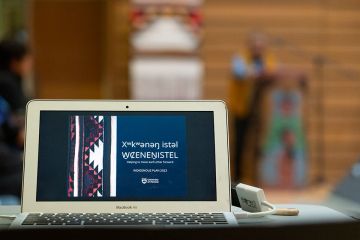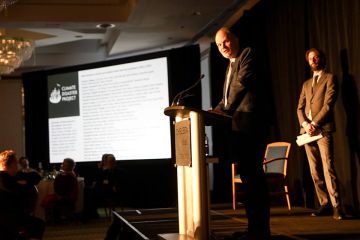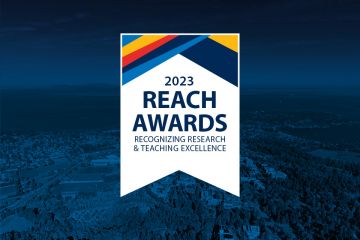REACH Awards
Science, Fine Arts, Humanities, Social Sciences, Human and Social Development, Education
On Oct. 10, the third annual REACH Awards will celebrate UVic scholars for their extraordinary contributions in research and teaching. Award recipients lead the way in dynamic learning and make a vital impact at UVic, in the classroom and beyond.
"Our REACH Awards celebrate teaching and research excellence at the University of Victoria,” says UVic President Jamie Cassels. “This year’s distinguished honourees are inspiring teachers and researchers, who are contributing to a better future for people and the planet."
- Excellence in teaching awards
- Excellence in research awards
- Andy Farquharson Teaching Excellence Awards for Graduate Students
Excellence in teaching awards
Harry Hickman Alumni Award for Excellence in Teaching and Educational Leadership
Scott McIndoe, Chemistry
Innovation and creativity are hallmarks of Scott McIndoe’s teaching and leadership. As an extraordinary teacher of large first year classes, McIndoe has introduced new ways of teaching chemistry, authoring highly successful lecture books, developing a revolutionary graduate course framework, blogging with students and utilizing 3D technologies to create molecular “hands-on” models to enhance student learning. His responsiveness to students is epitomized by his creation of an anonymous “real-time” solution for students to ask in-class questions. McIndoe is also a recognized leader in the scholarship of learning and teaching—influencing colleagues nationally and internationally. McIndoe’s students thrive, bringing molecular theory into reality attending to real-world problems like environmental sustainability, food security and medical advances.

Gilian Sherwin Alumni Award for Excellence in Teaching
Georgia Sitara, Gender Studies/History
A former student praises Georgia Sitara for showing her an “intersectional, anti-racist, and decolonial feminist understanding of the world.” Sitara encourages her history and gender studies students to cultivate the courage to use their voices and intellectual acumen to be agents of positive social change. She utilizes the principles of loving kindness and deep rigour to foster dynamic student-centred learning. Her commitment to ensuring Indigenous, queer and other marginalized students are well-supported to succeed within the academy and beyond contributes to a more inclusive and equitable future. She imbues her students with love and compassion through meticulous intellectual training.

Excellence in Teaching for Experiential Learning
Patrick Boyle, School of Music
Patrick Boyle forges musical partnerships with students that embody direct, active experiential learning and scholarship. Through faculty recitals, jam sessions, public performances and impromptu in-office practice sessions, Boyle creates avenues for students of jazz to explore their growing talents, embrace their musical and artistic values, and learn about the business of music. His pedagogical focus on the craft of improvisation, culture and composition emphasizes deepening students’ listening experience while creating something new. The vibrancy of his approach is visible in the jazz ensemble, with students sharing their music in community in formal and informal settings.

Excellence in Undergraduate Research-Enriched Teaching
Megan Swift, Germanic and Slavic Studies
A student describes Megan Swift’s teaching as a “beautiful example of show, don’t tell.” In her Russian studies courses, Swift integrates research and teaching, using multimedia, lecture and discussion to build connections between Russian culture, the revolution and the contrasts between the Lenin and Stalin eras with Putin’s Russia today. Swift’s vision of a research-based online encyclopedia and mapping project, “Dostoevsky’s St. Petersburg,” is exemplary. Using digital technologies and period materials, students trace aspects of the author’s literary works onto a map of St. Petersburg, publishing the findings in the form of short encyclopedia entries.

Excellence in Graduate Student Supervision and Mentorship
E. Paul Zehr, Exercise Science, Physical and Health Education
When you build teams of graduate and undergraduate students to collaborate on projects, share findings and support each other, you’re onto something special. E. Paul Zehr exemplifies the best traits of mentorship in the School of Exercise Science, Physical and Health Education. He inspires students toward independent exploration, to participate in international labs and teaches his methodologies to other scientists around the world. Zehr utilizes his lab for meetings to help graduate students navigate the many nuances of scholarly success from publications to presentations, methods to theories. As one student says: “These meetings are filled with no less than an academic goldmine of valuable information.”

Excellence in research awards
David H. Turpin Gold Medal for Career Achievement in Research
Budd Hall, Public Administration
For more than 40 years, Budd Hall has envisioned and worked to build a world that functions as a “knowledge democracy” through teaching, creating diverse and resilient networks, and helping communities drive research as a globally recognized innovator of participatory research. By taking this vision mainstream and global, his work has impacted university students, peers and the public—from injection drug users to homeless individuals, urban slum dwellers and rural poor to sex workers. Hall’s leadership on community-based research has transformed academia and, perhaps more importantly, the knowledge democracy that he champions has transformed lives.

David H. Turpin Gold Medal for Career Achievement in Research
Tim Stockwell, Psychology/Canadian Institute for Substance Use Research
Tim Stockwell has debunked myths about alcohol-related disease, created strategies that cut alcohol-related traffic deaths, studied the neurophysiology of addiction and shaped policy at all levels around the world. Promising scientists are drawn by his leadership, expertise, high standards and championing of both responsible policies and practices. International colleagues call him “one of the most productive and influential researchers” and say that he asks and answers “the critical questions, both for the advancement of science and in service of the public interest.” While Stockwell continues to build on his novel alcohol and addiction research, his example and mentorship encourage others to join the field and indeed to expand the reach of this life-changing work.

Silver Medal for Excellence in Research
Alisdair Boraston, Biochemistry and Microbiology
Alisdair Boraston is passionate in applying his research on carbohydrate-protein interactions. For one thing, he wants to identify new molecules that can be used to fight infections so we’re no longer at the mercy of drug-resistant bacteria. He is also working towards figuring out how marine and land-based plant material might be converted into biofuels or other useful bioproducts to potentially reduce our carbon footprint. But his impact goes beyond lab work and stellar publications. By generously sharing his equipment and his knowledge, he helps advance all students and other trainees in his department. As both a role model and as a scientist, Boraston is boosting the well-being of people at UVic and further afield, and indeed of our planet itself.

Excellence in Creativity and Artistic Expression
Kirsten Sadeghi-Yekta, Theatre
“Act well your part,” poet Alexander Pope once urged, because “there all the honour lies.” Through honour—scholarly, artistic and personal integrity—Kirsten Sadeghi-Yekta has earned the respect of communities around the world. Her applied theatre projects raise the curtain on social issues that impact people’s lives. She customized her approach to work with children in Downtown Eastside Vancouver and disabled young women in Cambodia, with youth in Brazillian favelas torn by drugs wars and special-needs students in the Netherlands, developing a safe space for them to create artistically, build skills and confidence, and find beauty. Most recently she has been invited to bring that experience into local focus. With the Hul’q’umi’num community on Vancouver Island, she is turning on the spotlight to help them revitalize a crucial part of their culture: their language.

Excellence in Knowledge Mobilization
Charlotte Schallié, Germanic and Slavic Studies
“One person has the capacity to make such a significant difference,” write Charlotte Schallié’s peers on the impact of her bringing the forgotten story of Carl Lutz into view. During World War II, the Swiss diplomat saved tens of thousands of Hungarian Jews, standing up to racism, intolerance and injustice; he was, in current terms, upstanding. Together with Agnes Hirschi (Lutz’s stepdaughter), Schallié travelled the world to find the people whose lives Lutz saved. She listened to their stories and shared them to raise awareness of Lutz’s heroic mission, speaking to media and at conferences and teaching a new generation of scholars and citizens. For her vision and the impact of her work, Schallié is also upstanding.

Excellence in Research Partnerships
William Carroll, Sociology
Shannon Daub, Canadian Centre for Policy Alternatives BC
William Carroll and co-nominee Shannon Daub want the world to know who’s who in fossil fuels. Together with more than 100 collaborators and 11 partner organizations, they are “Mapping the Power of the Carbon Extractive Corporate Resource Sector.” Carroll, a sociology professor at UVic, and Daub, the executive director of the Canadian Centre for Policy Alternatives BC, link five research streams with journalism and multifaceted knowledge mobilization. They’re integrating economics, political science, geography, earth science, sociology, law, political ecology, Indigenous studies, journalism and communication studies to investigate the organization and power of the fossil-fuel industry in Western Canada. Their project empowers Canadians as well as a democratic society.

Andy Farquharson Teaching Excellence Awards for Graduate Students
Natalie Boldt, English
“Natalie is one of the most kind and compassionate teachers that I have encountered,” writes one of Natalie Boldt’s colleagues. This statement is confirmed by many of Boldt’s students. They describe her ability to create a positive learning environment that allows all students to comfortably participate. Most importantly, students feel respected due to Boldt’s careful attention to their contributions in class—allowing her to sustain student engagement throughout the whole course.

Mehdi Hashemi, Political Science
Genuine, outstanding, caring and inspiring are just a few of the words that students use to describe Mehdi Hashemi. Students talk about the small gestures that Hashemi does that have a big impact on their academic well-being. For example, after meeting with a student about an upcoming assignment, Hashemi follows up with further support, inspiring the student to put in the extra effort. Through these small gestures, Hashemi truly inspires students to strive for high-quality work.

Leah Gajecki, Chemistry
Leah Gajecki’s ease in using a multitude of teaching techniques sets her teaching apart. When introducing new concepts, Gajecki explains, draws, illustrates through stories, links to real life examples, and connects to her research so that students are well supported in their learning. “My method,” she explains, “is to break down concepts in ways that anyone can understand.” Gajecki’s students recognize her ability to do this and are very grateful for her care and support.

Read more and view past recipients on the UVic Reach awards page.
Photos
















In this story
Keywords: teaching, award, research, sociology, biochemistry, microbiology, theatre, chemistry, history, music, english
People: Jamie Cassels
Publication: The Ring




